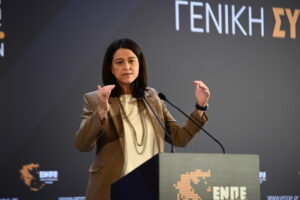Three recent initiatives undertaken by the Ministry of Labour and Social Security to protect people within. the disability community were outlined by the minister responsible, Niki Kerameos, in an interview with OPEN television.
The first concerns the correction of the distortion, due to which people with disabilities who met the requirements to receive a disability pension and were also employed, could not receive it if they had not previously stopped working. As the minister explained, with a legislative regulation, which she and the deputy minister, Panos Tsakloglou, drafted and included in a draft bill of the Ministry of Health, which is currently under public consultation, henceforth disability pension beneficiaries will be able to receive the pension without stopping working.
“The disabled person was faced with the following dilemma: support from the state or work. With the provision we have tabled, we are saying that there is neither one nor the other, both apply,” he said.
Referring to the Disability Certification Centres, (KEPA), Ms Kerameos said they are being strengthened with additional staff, as the more than doubling of doctors has been planned.
“From 520 we have provided for another 700 doctors, who are completing their training. More doctors means better and faster service to citizens,” he said.
In addition, the labor minister recalled that the list of irreversible conditions has been expanded and therefore more patients will not have to repeat their certification of disability.
“I have mentioned three indicative initiatives relating to the State’s support for people with disabilities,” he said.
On the issue of pensions, Mrs. Kerameos noted that an effort is underway to further speed up the awarding process and said that 1,250 main pensions are now being issued daily nationwide (down from 500 per day a few years ago), with the average issue time having been reduced to 60 days.
For supplementary pensions, he stressed that the situation is more complex, as a paper file and communication with many different funds are used to issue them.
“We are in a process with the administration of the e-EFKA, digitizing all this archive. We are talking about millions of sheets of paper, which are being digitized so that the supplementary pensions can come out much faster,” he added.
The Labour Minister revealed that in August, an effort was made with the administration and staff of the e-EFKA to speed up the issuance of supplementary pensions, achieving a reduction in pending cases by 12%, adding that in some cases, if the necessary data is digitized, the pension is issued in just 10 minutes.
Ms Kerameos also referred to the Pensioners’ Solidarity Contribution, noting that, shortly, a regulation will be submitted to the Parliament, which will correct the distortion that exists and results in some pensioners, while receiving an increase, finding a reduction in their pensions, as they change their scale and have to pay the Solidarity Contribution.
Regarding the pension increases announced by the Prime Minister at the Thessaloniki International Fair (TIF), the Labour Minister clarified that the estimated increase will be between 2.2% and 2.5% and will apply to the January 2025 pensions, which are paid at the end of December. As she clarified, now, the increase is derived from real economic data and, in particular, from inflation and the country’s economic growth.
On the Digital Work Card, Mrs. Kerameos noted that the aim is for the employee to be paid for the actual time worked.
It is recalled that the Digital Work Card measure started to be implemented two years ago in large supermarkets, banks, public utilities, security companies and, since last July, it has been universally applied in industry and retail. “At the moment, we have 1.5 million workers protected by the Digital Work Card,” the minister said, noting at the same time that in some sectors there has been an increase in overtime of about 62%. “Where were these overtime hours before?” she asked, noting that one explanation is the growth of the economy, which, however, is not corresponding. Also, the Digital Job Card is now being piloted in tourism and catering.
“Our mission is to protect the worker and healthy competition,” he commented.
Asked about Collective Labour Agreements, Mrs. Kerameos replied that they will help make labor relations healthier, assuring that: “We, as a State, will do whatever it takes.” However, she clarified that to achieve this, “we need to have representatives of employees and representatives of employers at the same table”.
We, as the State, will continue to do our part.
Finally, in response to a question regarding the informative meetings of ministers with New Democracy MPs, the Labour Minister remarked that the dialogue she had the other day with members of the party’s parliamentary group on issues related to her portfolio was extremely fruitful.
“It lasted four hours, one of the most fruitful and useful I have spent in the Greek parliament,” she stressed.
Ask me anything
Explore related questions





